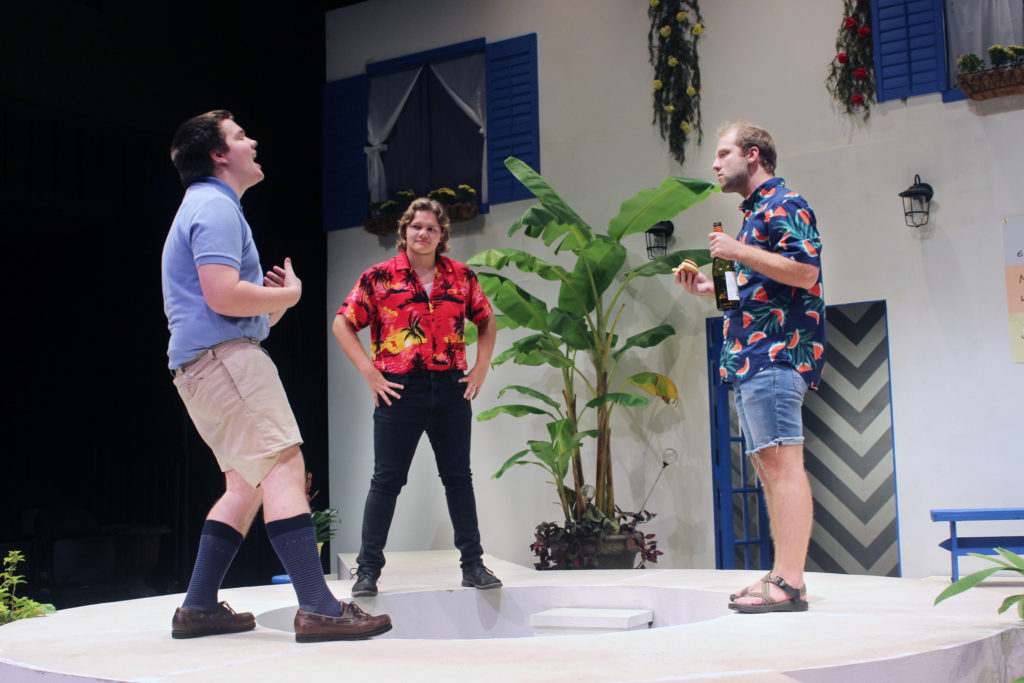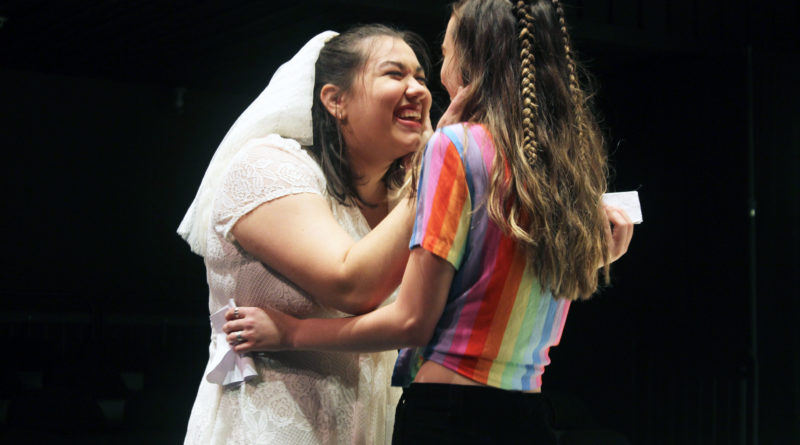Modern “Much Ado About Nothing” reaches new demographic of audience
The Maryville College Theatre Department’s fall show this year, “Much Ado About Nothing” directed by Walker Harrison, premiered last week on Oct. 10 and had its final performance on Oct. 13. The play is a Shakespearean comedy that follows the love lives of two different couples after the end of a civil war between two brothers, Don Pedro (played by Christopher Rodriguez) and Don Juan (played by Jacob Hudson).
The first couple, Hero (played by Brittany Barthelmess) and Claudio (played by Lucas Gasche), are obviously in love with each other and quickly become engaged. The other couple, Beatrice (played by Alison Parton) and Benedick (played by Hudson Perrine), start out as enemies but fall in love after their friends trick each of them into believing the other has feelings for the other.
Upset by losing the war with his brother, Don Jon convinces Claudio that Hero is unfaithful, so he publicly ridicules her on their wedding day and calls the whole thing off. Hero’s family fakes her death and, with Don Jaun’s trickery revealed, proves her innocence. Both of the couples marry by the end of the show. Harrsion did add an extra scene of the couples being separated as the soldiers are called back to war.

Photos by Nance
The play was originally set in sixteenth century Messina, Italy, which is located on the Island of Sicily, but this production reimagines the play in modern day Mykonos, Greece. The traditionally male role of Benedick was reimagined as female, making one of the main couples a homosexual pair.
While it would have been easy to rely on lesbian stereotypes for laughs, Harrison made the smart decision to avoid doing so. Instead, he let the characters’ chemistry—and the natural dynamic between Perrine and Parton—speak for itself. The use of technology was a heavy theme throughout the show with many of the characters using smartphones and tablets.
The actors took a more realistic approach with their acting style. They did not slow down their speech in hopes to allow the audience a better chance of understanding them. On the contrary, they spoke their lines with the fluidity and naturalness of someone speaking modern day english. This gave context that even those of the audience not versed in the language of Shakespeare could understand.
The acting in this production was exceptional. The realistic approach lent itself to both the play’s comedic and dramatic scenes. This resulted in the audience holding their sides with laughter at the ridiculous antics of drunks and holding back tears during more gut wrenching, emotional scenes.
The interpretations of the characters are to be commended as well. The villain’s goofy antics, as well as the portrayal of the protagonists’ flaws, allowed for the lines of good and bad to be blurred. The audience was able to sympathize with the antagonists and question the morals of the heros.
The actors gave new connotation to Shakespeare’s innuendos. One downfall of the acting is that the fast paced acting may have caused the audience to miss Shakespeare’s witty dialogue in favor of focusing on the more physical aspect of the comedy.
Harrison’s portrayal of love in the modern day is commendable. However, his attempt to comment on war leaves much to be desired. The production, being set in Greece, references the current refugee crisis in the country through the prerecorded podcast at the beginning of the show and a sign that reads: “No matter where you’re from, we’re glad you’re our neighbor.” It is a noble attempt, but one that is too implicit for the audience to catch on to.
At no point during the production is the sign referenced. The podcast is an excellent way to set the stage of the civil war in more modern terms, but it is not utilized after the first scene to keep the theme of war going. In fact, war is not mentioned again until the end of the show during the added scene. T
The scene is mostly silent, allowing its implications to be muddled among the audience. The only consistent reference to war throughout the production, that is not part of the script, are the uniforms some of the cast wear. However, the uniforms are not geographically accurate to modern day Greece and look more like U.S. air force JROTC uniforms. It’s clear that the uniforms were more for aesthetic than accuracy.
While the production did have some thematic bumps, it was an overall success. Both Shakespeare fans and newbies alike enjoyed the show. That much was obvious by the audience’s laughter and verbal shock throughout the performance.

